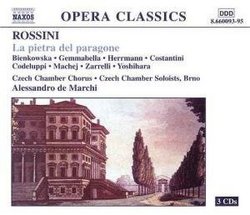Walk On By
J Scott Morrison | Middlebury VT, USA | 08/16/2004
(2 out of 5 stars)
"This recording of Rossini's all-but-unknown early opera buffa 'La pietra del paragone' ('The Touchstone') is actually one of four that have been made and are available (with some searching, in the case of my recommended performance). I first heard and fell in love with it when Newell Jenkins recorded it with his Clarion Concerts cohorts. The recording, made thirty years ago, starred José Carreras, Justino Diaz, Beverly Wolff, Elaine Bonazzi, and John Reardon, all of them at the time New York City Opera stars of the first rank. And although Diaz (as Count Asdrubale) was somewhat deficient in his coloratura, he was giant compared to the Asdrubale on this CD, Raffaele Costantini, whose soft-cored and somewhat unwieldy voice simply isn't up to the task. The same is true for the female lead, mezzo Agata Bienkowska, whose voice, one must say, matches that of her costar.
This recording was taken from live performances at Bad Wildbad, Germany as part of the 'Rossini in Wildbad' festival in 2001. The Czech Chamber Soloists and Chorus under Alessandro de Marchi do a fine job playing and singing Rossini's bubbly music. It's just a shame that none of the soloists matches their wit and sparkle.
I have not heard the other two extant recordings (Desderi, cond., on Nuova Era with unknown [to me] singers; and Aprea, cond., with the redoubtable Sara Mingardo, alto, and William Matteuzzi, tenor, on Bongiovanni) but I have had little complaint with the Jenkins recording and thus have not sought them out.
My advice, then, is to search for the Newell Jenkins performance (available at several sources online), and skip this one.
Scott Morrison"
Fantastic spirit, adequate performers.
B. Bork | Ontario, Canada | 09/23/2006
(5 out of 5 stars)
"I had never heard of this opera before I purchased it but my interest in Rossini and his neglected works is a personal passion so I ordered this item and waited patiently for it's arrival. I was not disappointed.
The vocalists as a whole are adequate performers with niehter poor nor incredible performances but where they do succeed beyond fair is as an ensemble. This opera consists of two introduziones, two duetto's, one quartetto, one quintetto, two finales, about seven solo pieces and a few coro's. The ensemble numbers are solid and balanced with no performer(s) singing over the others; the cast sing to each other during these numbers rather than to us which means they uphold the important spirit of the ensemble: interpersonal communication.
Where this opera also succeeds is in it's orchestration and truth to Rossini's melodic and dramatic sensibilities. The music is appropriately bright and florid with that special sense of the overwhelming which Rossini is particularly known for. To build on that, the stretta for the first act finale in this recording is a model of intensity which many recordings of Rossini's other opera's lack. Try listening to this stretta when your feeling overwhelmed by those moments in life which are felt with intensity and you'll see what I mean (or other moments like being a passenger in a speeding car during a rain storm: pretty intense).
The style of this opera has more to do with the imitation of other composers of the time than with Rossini's mature style but it's still very potent none the less. One can hear a strong dose of Mosca, a pinch of Mayr and even a bit of residual Cimarosa. There are also some portions of re-used melodies from "L'equivoco stravagante" and probably from some of his other early operas.
I highly recommend this recording to anyone interested in Rossini specifically or in early bel canto opera."


 Track Listings (16) - Disc #1
Track Listings (16) - Disc #1